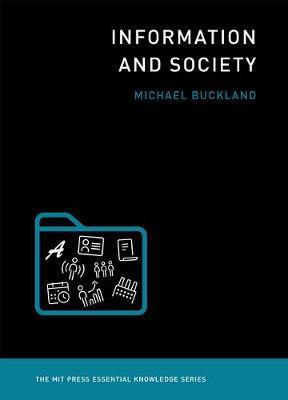Information and Society

Information and Society
We live in an information society, or so we are often told. But what does that mean? This volume in the MIT Press Essential Knowledge series offers a concise, informal account of the ways in which information and society are related and of our ever-increasing dependence on a complex multiplicity of messages, records, documents, and data. Using information in its everyday, nonspecialized sense, Michael Buckland explores the influence of information on what we know, the role of communication and recorded information in our daily lives, and the difficulty (or ease) of finding information. He shows that all this involves human perception, social behavior, changing technologies, and issues of trust.
Buckland argues that every society is an "information society"; a "non-information society" would be a contradiction in terms. But the shift from oral and gestural communication to documents, and the wider use of documents facilitated by new technologies, have made our society particularly information intensive. Buckland describes the rising flood of data, documents, and records, outlines the dramatic long-term growth of documents, and traces the rise of techniques to cope with them. He examines the physical manifestation of information as documents, the emergence of data sets, and how documents and data are discovered and used. He explores what individuals and societies do with information; offers a basic summary of how collected documents are arranged and described; considers the nature of naming; explains the uses of metadata; and evaluates selection methods, considering relevance, recall, and precision.
PRP: 115.37 Lei
Acesta este Pretul Recomandat de Producator. Pretul de vanzare al produsului este afisat mai jos.
92.30Lei
92.30Lei
115.37 LeiLivrare in 2-4 saptamani
Descrierea produsului
We live in an information society, or so we are often told. But what does that mean? This volume in the MIT Press Essential Knowledge series offers a concise, informal account of the ways in which information and society are related and of our ever-increasing dependence on a complex multiplicity of messages, records, documents, and data. Using information in its everyday, nonspecialized sense, Michael Buckland explores the influence of information on what we know, the role of communication and recorded information in our daily lives, and the difficulty (or ease) of finding information. He shows that all this involves human perception, social behavior, changing technologies, and issues of trust.
Buckland argues that every society is an "information society"; a "non-information society" would be a contradiction in terms. But the shift from oral and gestural communication to documents, and the wider use of documents facilitated by new technologies, have made our society particularly information intensive. Buckland describes the rising flood of data, documents, and records, outlines the dramatic long-term growth of documents, and traces the rise of techniques to cope with them. He examines the physical manifestation of information as documents, the emergence of data sets, and how documents and data are discovered and used. He explores what individuals and societies do with information; offers a basic summary of how collected documents are arranged and described; considers the nature of naming; explains the uses of metadata; and evaluates selection methods, considering relevance, recall, and precision.
Detaliile produsului








